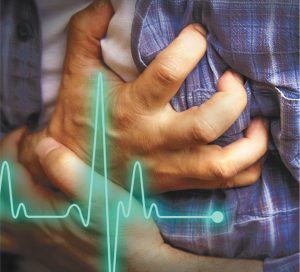By Dr. Aneley Yegezu Hundae, M.D., FACC
 Sudden cardiac death (SCD) is an unexpected, abrupt loss of heart function, breathing, and consciousness. It usually derives from an electrical disturbance that disrupts the heart’s pumping action, causing the heart to stop beating effectively. SCD is a major public health crisis, accounting for half of all heart disease deaths.
Sudden cardiac death (SCD) is an unexpected, abrupt loss of heart function, breathing, and consciousness. It usually derives from an electrical disturbance that disrupts the heart’s pumping action, causing the heart to stop beating effectively. SCD is a major public health crisis, accounting for half of all heart disease deaths.
While heart attacks are the most common cause of SCD, the two are not the same. A heart attack is caused by a blocked artery preventing blood flow to the heart muscle. SCD is triggered by an electrical malfunction in the heart that sends it into a chaotic rhythm known as ventricular fibrillation. Without an effective blood supply, a person quickly goes unconscious and suffers respiratory arrest.
SCD is often the first sign of heart disease, striking without any prior symptoms in over half of cases. It can happen to people of any age, though the risk increases as people get older. Other risk factors include a previous heart attack or heart failure, family history of SCD, obesity, smoking, high blood cholesterol, and diabetes.
The key risk factor is the presence of underlying coronary heart disease. Scarring from a prior heart attack can disrupt the heart’s electrical pathways, leaving it susceptible to short-circuiting into a lethal heart rhythm. In other cases, the heart muscle is weakened by disease, stretching or thickening its walls in a way that promotes abnormal heart rhythms.
When SCD occurs, prompt CPR and defibrillation are crucial to restart the heart and restore breathing and consciousness. An automated external defibrillator (AED) can be a lifesaver, delivering an electrical shock to stop the chaotic heart rhythm and let the heart restart in a normal pattern.
The most effective prevention strategy is recognizing those at high risk and addressing underlying heart conditions. However, many victims have no clear warning signs or risk factors, making SCD a feared medical emergency. Experts recommend improving bystander CPR training and increasing public access to AEDs as ways to improve survival odds.
Signs of sudden cardiac death:
• Sudden collapse and loss of consciousness – This is often the first and only sign of cardiac arrest before the heart stops beating entirely.
• No pulse or breathing – Check for a pulse at major arteries and look for rise/fall of the chest which could indicate breathing.
• Bluish discoloration of lips/skin – This can happen due to lack of oxygenated blood circulation during cardiac arrest.
• Dizziness or weakness before collapse – Some people experience these symptoms shortly before cardiac arrest strikes.
• Chest discomfort or pain – Preceding heart attack symptoms like chest pain or pressure can sometimes occur before sudden cardiac arrest.
• Nausea or vomiting – This can occasionally happen right before the heart stops in some cases of cardiac arrest.
For those with risk factors like heart disease, heart failure, or a family history of SCD, measuring risk through screening tests may be advised.
An electrocardiogram (ECG) can detect heart rhythm irregularities, while an echocardiogram provides structural imaging of the heart’s chambers and muscularity. Implantable cardioverter defibrillator (ICD) devices may be recommended for high-risk patients, providing prompt defibrillation if a lethal arrhythmia occurs.
While medical and technological advances have helped understand and respond to SCD, it remains a pernicious threat. More research is still needed on risk factors, prediction models, and prevention strategies. Increasing awareness of SCD and preparedness to act when it strikes remain crucial for saving lives from this silent cardiovascular killer.
SCD can also be on inital presentation in young athletes during competitive sports. Certain underlying structural health diseases are indentified as underlying causes of SCD in athletes. Screening by health professionals may be suggested for young athletes.
Dr. Aneley Yegezu Hundae, M.D., FACC
invasive cardiology and advanced heart failure management
Dr. Hundae received his Premedical and Doctor of Medicine Degree from Jimma University School of Medicine. He completed his Internal medicine Residency at Mercer University School of Medicine. His Heart Failure/Heart Transplant fellowship at the University of Miami Cardiovascular Fellowship Program. Cardiovascular fellowship at Baylor University Medical Center.
Board certifications
• Cardiology
• Advanced Heart Failure and Transplant
• Nuclear Cardiology
• Comprehensive Echocardiography
• Internal Medicine
3161 Harbor Blvd, Suite A, Port Charlotte, FL 33952
(941) 235-8892
www.portcharlottecardiology.com









